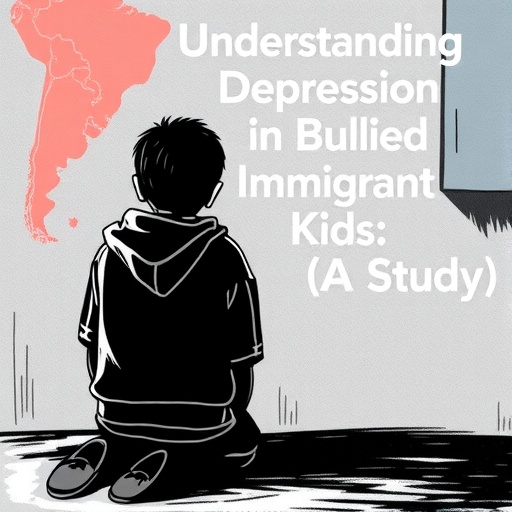In a compelling exploration of a pressing social issue, researchers Cheng and Lo have unveiled significant findings regarding the mental health challenges faced by bullied immigrant children. Their recent publication in the Journal of Child and Family Studies highlights an alarming connection between multiple disadvantages and the prevalence of depression among these vulnerable youth. As global migration increases and children often find themselves navigating new cultures, the challenges they face can be both multilayered and profoundly impactful on their psychological well-being.
The study draws attention to how bullying exacerbates the already complex struggles that immigrant children experience, including cultural dislocation, social isolation, and often a lack of support systems within their new communities. The intersection of these factors creates a fertile ground for mental health issues, particularly depression. This research is critical as it sheds light on the urgent need for targeted interventions and support mechanisms tailored to the unique circumstances that these children face.
Immigrant children are frequently caught in a web of adversities. Language barriers, unfamiliar educational systems, and the pressure to succeed academically while adapting to a new environment can contribute significantly to their stress levels. Add the factor of bullying—a pervasive issue affecting many children, regardless of their background—and the result is a compounded risk for mental health disorders. Cheng and Lo’s analysis utilizes a multiple disadvantage model to better understand these interactions, offering a comprehensive viewpoint on the underlying causes of depression in bullied immigrant youth.
Drawing on extensive data gathering and careful analysis, the researchers found that the confluence of multiple disadvantages uniquely influences the mental health trajectory of these children. For instance, the inability to communicate fluently in the dominant language may lead to social withdrawal and increased susceptibility to bullying. These experiences can have cascading effects, negatively impacting their academic performance and further deepening feelings of inadequacy and despair.
Moreover, the emotional ramifications of bullying extend beyond immediate psychological distress. The long-term implications for bullied immigrant children may include chronic depression, anxiety disorders, and even suicidal ideation. Cheng and Lo’s findings serve as a clarion call to educators, mental health professionals, and policymakers to recognize the urgency of implementing comprehensive strategies aimed at providing access to psychosocial support for these children. Educators must be equipped with the tools and training necessary to identify signs of distress and intervene appropriately.
The study’s methodology incorporated various quantitative and qualitative measures to assess the impact of bullying on immigrant children’s mental health. Participants were drawn from diverse backgrounds, allowing for a rich tapestry of experiences to inform the researchers’ conclusions. This nuanced approach highlights the different layers of adversity faced by children who migrate, emphasizing that not all immigrant experiences are the same and that solutions must be customized accordingly.
Understanding the role of protective factors is also crucial in addressing the mental health challenges of bullied immigrant children. Cheng and Lo identified mechanisms such as family support, community involvement, and access to mental health resources as vital to mitigating the effects of bullying and adversity. By fostering a sense of belonging and support for these children, we can create environments that nurture resilience and promote mental well-being.
One of the critical aspects of the research is the call for systemic change. Cheng and Lo advocate for the creation of frameworks that address the unique stressors faced by immigrant children. This includes advocating for inclusive programs within schools that acknowledge and address cultural diversity. Moreover, awareness campaigns aiming to reduce stigma surrounding mental health issues among immigrant populations are essential. By promoting open conversations about mental health, we can combat feelings of isolation and vulnerability experienced by these youths.
Echoing the research’s findings is a universal truth: the impact of bullying is profound and far-reaching. For immigrant children, the equation becomes even more complex, as their identities are often tied to their cultural backgrounds and experiences of migration. Therefore, effective interventions must take into account this multifaceted identity, ensuring that therapeutic approaches are culturally sensitive and relevant.
The study also highlights the importance of collaboration among various stakeholders—schools, mental health professionals, community organizations, and families—to create an ecosystem of support around bullied immigrant children. Multidisciplinary teams can develop holistic approaches, including counseling services, peer support programs, and initiatives that promote cultural understanding within educational institutions.
In conclusion, Cheng and Lo’s research serves as a pivotal contribution to the discourse surrounding the mental health of immigrant children. The findings illuminate the interplay between bullying and multiple disadvantages, providing a foundation for future studies aimed at developing effective interventions. As society grapples with an increasingly diverse population, understanding and addressing the challenges faced by bullied immigrant children is paramount. The call for action is clear: comprehensive support systems must be established to protect these youth from the detrimental effects of bullying and to empower them in their journeys towards healing and thriving in their new environments.
Subject of Research: The mental health challenges of bullied immigrant children
Article Title: Depression of Bullied Immigrant Children: An Analysis with Multiple Disadvantage Model
Article References:
Cheng, T.C., Lo, C.C. Depression of Bullied Immigrant Children: An Analysis with Multiple Disadvantage Model.
J Child Fam Stud (2025). https://doi.org/10.1007/s10826-025-03127-7
Image Credits: AI Generated
DOI:
Keywords: Immigrant children, bullying, mental health, depression, multiple disadvantages, adversity, psychosocial support.




